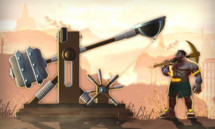A Dundee video games developer is taking its “destiny into its own hands” after revealing it will launch its first completely self-funded title.
Ruffian Games will unveil Tribal Towers to a hand-picked gameplay test group of friends and family ahead of its launch later this year.
Ruffian Games Producer James Cope said: “The way that Tribal Towers has been done as a self-funded and self-published thing is actually a step out into something that is potentially more secure in terms of our place in the industry and interacting with our audience.
“We have seen a lot of independent developers who have been incredibly successful and that has led to a more secure position for their company than with an existing publisher relationship.
“Even traditional publisher/developer arrangements are risky, and we can see that by the number of studios that are shutting down across the world. That’s not to say we are abandoning that.
“The nature of the market at the moment is that it is undergoing a lot of change and we have to progress and react to that change. Having something we can wholly call our own is a way to secure some of that future. I wouldn’t say it’s without risk, I think it’s just with different risk.
“All developers are now having to react to, in terms of getting closer to their customer base.”
The title is initially being developed for PC and Mac before being extended to other platforms.
Mr Cope said: “It is an interesting game in terms of it being something we think is unique. It has elements of other titles, but they are just like inspirational pieces rather than emulating any particular type of game.
“We do think we stand out on our own with it, which is why we are so excited.”
The company was formed in 2008 by Billy Thomson and Gaz Liddon, both previously of Dundee video game developer Realtime Worlds.
Mr Thomson, who is Ruffian Games creative director, wrote recently that the self-funded project allowed the company to “take our destiny into our own hands”.
As well as Tribal Towers, Ruffian is working on a “top-secret project” with a well-known games publisher.
Mr Cope said: “There’s nothing we can really say about it at the moment, not even estimated timescales.
“What I can say about it, is that we’re excited and it is a really big thing for us. Tribal Towers is a smaller project on the side of it and it will be a much more different game in terms of its audience.”
